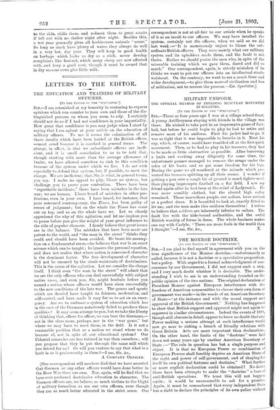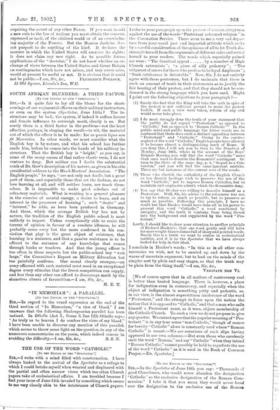THE MONROE DOCTRINE.
[TO TIM EDITOR OF THE "SPECTATOR."]
am glad to find myself in agreement with you on the true significance of the Monroe doctrine,—unfortunately so called, because it is not a doctrine or a speculative proposition. but a policy. With regard to a formal acknowledgment of con- currence by our Government, I did not suggest such a step, and I very much doubt whether it is desirable. The under- standing I wish to see is an understanding founded on the public opinion of the two nations. The original declaration of President Monroe against European interference with the freedom of American communities to choose their own form of government was made—in the words of an American Secretary of State—" at the instance and with the moral support and approval of the British Government." Nothing has happened to show that British support and approval might not again be expected in similar circumstances. Indeed the events of 189S, though still obscure in detail, appear to leave no doubt that any Power making a serious attempt at such interference would now go near to risking a breach of friendly relations with Great Britain. Acts are more important than declarations. On the other hand, the limits of the "doctrine" were laid down not many years ago by another American Secretary of State :—" The rule in question has but a single purpose and object. It is that no European Power or combination of European Powers shall forcibly deprive an American State of the right and power of self-government, and of shaping for itself its own political fortunes and destinies." What further or more explicit declaration could be obtained? No doubt there have been attempts to make the " doctrine " a base of anti-British operations. We trust this will not happen again ; it would be unreasonable to ask for a promise. Again, it must be remembered that every independent State has a right to declare the principles of its own policy without
requiring the assent of any other Power. If you want to add a new rule to the law of nations you must obtain the consent, expressed or tacit, of the civilised world or of an overwhelm- ing majority of the Powers. But the Monroe doctrine does not purport to do anything of the kind. It declares the manner in which the United States will exercise its rights ; it does not claim any new right. As to possible future applications of the "doctrine," I do not know whether an ex- change of views between the United States and Great Britain on contingencies which have not arisen, and may never arise, would at present be useful or not. It is obvious that it could
not be public.—I am, Sir, &c., FREDERICK POLLOCK. 13 Old Square, Lincoln's Inn, W.C.







































 Previous page
Previous page